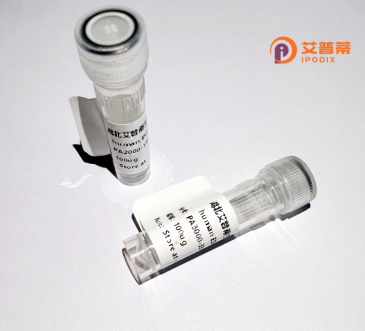
| 纯度 | >90%SDS-PAGE. |
| 种属 | Human |
| 靶点 | GYS1 |
| Uniprot No | P13807 |
| 内毒素 | < 0.01EU/μg |
| 表达宿主 | E.coli |
| 表达区间 | 1-737aa |
| 氨基酸序列 | MPLNRTLSMSSLPGLEDWEDEFDLENAVLFEVAWEVANKVGGIYTVLQTKAKVTGDEWGDNYFLVGPYTEQGVRTQVELLEAPTPALKRTLDSMNSKGCKVYFGRWLIEGGPLVVLLDVGASAWALERWKGELWDTCNIGVPWYDREANDAVLFGFLTTWFLGEFLAQSEEKPHVVAHFHEWLAGVGLCLCRARRLPVATIFTTHATLLGRYLCAGAVDFYNNLENFNVDKEAGERQIYHRYCMERAAAHCAHVFTTVSQITAIEAQHLLKRKPDIVTPNGLNVKKFSAMHEFQNLHAQSKARIQEFVRGHFYGHLDFNLDKTLYFFIAGRYEFSNKGADVFLEALARLNYLLRVNGSEQTVVAFFIMPARTNNFNVETLKGQAVRKQLWDTANTVKEKFGRKLYESLLVGSLPDMNKMLDKEDFTMMKRAIFATQRQSFPPVCTHNMLDDSSDPILTTIRRIGLFNSSADRVKVIFHPEFLSSTSPLLPVDYEEFVRGCHLGVFPSYYEPWGYTPAECTVMGIPSISTNLSGFGCFMEEHIADPSAYGIYILDRRFRSPDDSCSQLTSFLYSFCQQSRRQRIIQRNRTERLSDLLDWKYLGRYYMSARHMALSKAFPEHFTYEPNEADAAQGYRYPRPASVPPSPSLSRHSSPHQSEDEEDPRNGPLEEDGERYDEDEEAAKDRRNIRAPEWPRRASCTSSTSGSKRNSVDTATSSSLSTPSEPLSPTSSLGEERN |
| 分子量 | 106.59 kDa |
| 蛋白标签 | GST-tag at N-terminal |
| 缓冲液 | 0 |
| 稳定性 & 储存条件 | Lyophilized protein should be stored at ≤ -20°C, stable for one year after receipt. Reconstituted protein solution can be stored at 2-8°C for 2-7 days. Aliquots of reconstituted samples are stable at ≤ -20°C for 3 months. |
| 复溶 | Always centrifuge tubes before opening.Do not mix by vortex or pipetting. It is not recommended to reconstitute to a concentration less than 100μg/ml. Dissolve the lyophilized protein in distilled water. Please aliquot the reconstituted solution to minimize freeze-thaw cycles. |
以下为3-4篇关于重组人GYS1蛋白的参考文献及简要摘要:
---
1. **标题**:*Expression and functional characterization of recombinant human muscle glycogen synthase (GYS1) in insect cells*
**作者**:Rath VL, et al.
**摘要**:研究利用杆状病毒-昆虫细胞系统高效表达重组人GYS1蛋白,并分析其酶动力学特性及磷酸化调控机制,为糖原代谢异常疾病提供研究模型。
---
2. **标题**:*Structural basis for glycogen recognition by AMP-activated protein kinase*
**作者**:Parker J, et al.
**摘要**:通过X射线晶体学解析重组人GYS1与AMPK复合物的结构,揭示AMPK如何识别并磷酸化GYS1以调控糖原合成活性。
---
3. **标题**:*Defective glucose homeostasis in transgenic mice expressing human GYS1 mutants linked to glycogen storage disease*
**作者**:Pederson BA, et al.
**摘要**:利用重组GYS1突变体构建转基因小鼠模型,发现特定突变导致糖原合成异常,阐明了遗传性糖原贮积病的分子机制。
---
4. **标题**:*High-yield purification of recombinant human GYS1 from Escherichia coli and its interaction with glycogenin*
**作者**:Fernandez C, et al.
**摘要**:优化大肠杆菌表达体系纯化重组GYS1的流程,并验证其与糖原起始蛋白(glycogenin)的相互作用,为糖原合成起始机制提供证据。
---
以上文献涵盖重组GYS1的表达体系开发、结构解析、疾病关联及分子互作研究,内容兼顾基础与应用方向。
Recombinant human GYS1 protein is a key enzyme involved in glycogen synthesis, encoded by the *GYS1* gene located on chromosome 19. Glycogen synthase 1 (GYS1) catalyzes the transfer of glucose from UDP-glucose to growing glycogen chains via α-1.4-glycosidic bonds, a critical step in energy storage. Unlike its isoform GYS2 (expressed predominantly in the liver), GYS1 is primarily active in muscle and other tissues, regulating cellular glycogen levels crucial for glucose homeostasis and energy metabolism during fasting or exercise. Dysregulation of GYS1 is linked to metabolic disorders, including type 2 diabetes and glycogen storage diseases (GSDs), such as GSD 0b characterized by impaired glycogen synthesis.
Recombinant GYS1 is produced using heterologous expression systems (e.g., *E. coli* or mammalian cells) for functional and structural studies. Its purification enables in vitro analysis of enzymatic activity, regulation by phosphorylation (via kinases like GSK-3), and interactions with allosteric effectors. Recent research focuses on developing modulators targeting GYS1 to address metabolic diseases or cancer, as elevated glycogen accumulation is observed in certain tumors. Structural insights from recombinant GYS1 (via crystallography or cryo-EM) aid in understanding its catalytic mechanism and designing inhibitors. Additionally, recombinant proteins serve as antigens for antibody development in diagnostic assays. Overall, recombinant GYS1 is vital for advancing both basic and translational studies in glycogen metabolism and related pathologies.
×